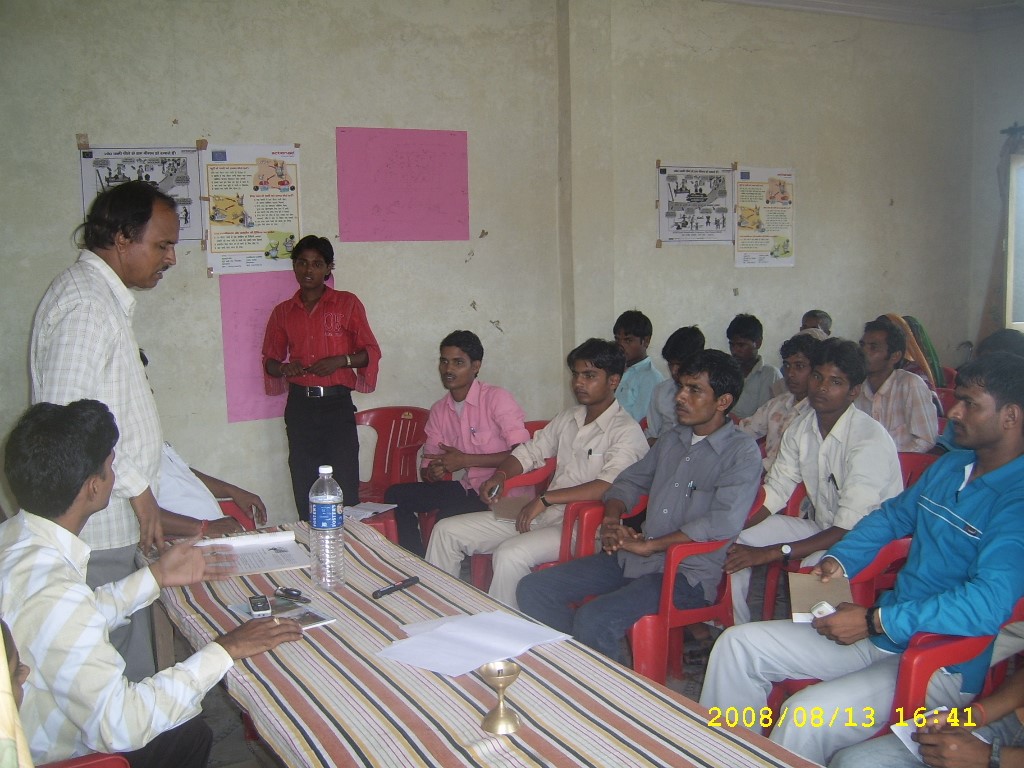Disaster Management/ Mitigation Program – 2011
In the year 2011, Swabhiman Samiti organized a Disaster Management and Training Program in Siddharthnagar district to equip local communities and volunteers with essential disaster preparedness skills. This program included a 4-day training and mock drill focusing on key disasters such as floods, earthquakes, and fire hazards.
- Objective of the Program:
The main objectives of the Disaster Management and Mitigation Program were:
- To provide basic disaster management training to volunteers, focusing on the prevention, preparedness, response, and recovery from disasters.
- To reduce loss of life and property during emergencies by training volunteers in first aid, search and rescue operations, and the recognition of toxic snake bites.
- To establish community-based disaster management committees in villages, ensuring the preparedness and resilience of the community.
- Training Focus:
The 4-day training program in Siddharthnagar concentrated on the following areas:
- Floods: Understanding flood risks and strategies to minimize losses during floods.
- Earthquakes: Training on safety measures and evacuation procedures during earthquakes.
- Fire Hazards: Techniques to prevent and respond to fire accidents, especially in rural areas.
The training was designed to provide practical knowledge on disaster management, including:
- Basic First Aid: How to provide initial medical help during emergencies.
- Snake Bite Identification: Recognizing and responding to toxic snake bites, which are common in flood-affected areas.
- Search and Rescue Operations: Techniques for searching and rescuing individuals in disaster situations.
- Expert Trainers:
The training was conducted by expert trainers, including:
- Mr. Sanjay Srivastava, Chief Trainer from the District Disaster Management Program Committee, Siddharthnagar.
- Mr. Rakesh Srivastava from Basti and four other trainers who specialized in various aspects of disaster management.



- Mock Drill and Community Engagement:
A key component of the program was the mock drill held during the final phase of the training. The mock drill simulated real-life scenarios of floods, earthquakes, and fire incidents, where search and rescue operations, first aid, and disaster response were practiced by the trainees in front of hundreds of villagers.
The drill aimed to:
- Test the skills of the volunteers in handling emergency situations.
- Demonstrate the importance of community participation in disaster management.
- Formation of Disaster Management Committees:
As part of the program’s long-term strategy, Swabhiman Samiti facilitated the formation of 8 Disaster Management Committees in 3 Gram Panchayats and 8 hamlets across the district. These committees were tasked with:
- Coordinating disaster response efforts within the communities.
- Ensuring preparedness for future disasters by organizing drills and awareness campaigns.
- Providing leadership during actual disasters to minimize risks and support affected families.
- Impact of the Program:
The Disaster Management and Mitigation Program had several positive outcomes:
- Increased Preparedness: The program successfully trained 40 volunteers who are now equipped to handle disasters in their communities, reducing loss of life and property during emergencies.
- Community Mobilization: By forming Disaster Management Committees in local communities, the program ensured a community-driven approach to disaster management, promoting collective responsibility.
- Skill Development: Volunteers gained practical experience in first aid, search and rescue, and disaster response, empowering them to take action when disasters strike.
- Conclusion:
The Disaster Management and Mitigation Program organized by Swabhiman Samiti in collaboration with the District Disaster Management Program Committee, Siddharthnagar, was an essential step in building resilience in the region. The training and formation of Disaster Management Committees have equipped communities with the necessary skills to effectively respond to disasters and mitigate their impacts.
Swabhiman Samiti continues its commitment to disaster preparedness, ensuring that communities are well-prepared for any future challenges and can minimize losses during emergencies.






